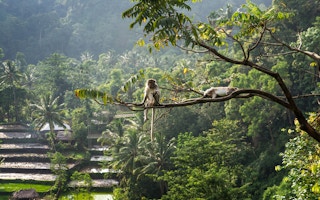The Reducing Emissions from Deforestation and Forest Degradation plus (REDD+) Management Agency is urging the incoming government to remain committed to ongoing efforts to reduce carbon emissions.
The Jakarta Post interviewed REDD+ Management Agency chairman Heru Prasetyo. Here is an excerpt.
Question: How does the agency plan to reduce carbon emissions in Indonesia?
Answer: At the 2009 G20 Summit, President Susilo Bambang Yudhoyono announced that Indonesia, working in its own interests, would be willing to reduce carbon emissions by 26 per cent by 2020. But then he promised a 41 per cent reduction if the world cooperated.
The following year, Norway said: “It matters for us” and promised US$1 billion.
Then we developed the national REDD+ strategy. Many problems arose because the initiative was implemented without a plan.
“
There’s a lot of unfinished work, such as the indigenous groups’ rights bill that the House of Representatives should ratify. Then there are a few judiciary issues, such as conducting [forest] concession reviews across the board
Heru Prasetyo, chairman, REDD+ Management Agency
We found there was a need for institutional development and increased coordination, regulations needed to be updated, we also needed a better map to report to the world, we then needed to make changes in the legal system and law enforcement. Finally, we decided to use a multi-stakeholder approach to promote discussion.
These five strategies were translated into the REDD+ Management Agency, which began operating in 2014.
Then we asked: “Which is more important: reducing emissions or the effort to reduce emissions?”
The efforts emerged as the core of the movement, so we organised activities geared toward the end goal of reducing emissions, such as empowering indigenous communities to reclaim their land, delineating forest boundaries, keeping companies in check and etc.
But the agency had a clear benchmark: to get Indonesia ready on an operational and institutional basis in 2016 so it could begin measuring and reporting emissions to the world.
What does the initiative use as a benchmark for emission reductions?
In Indonesia’s Second National Communication under the UNFCCC [United Nations Framework Convention on Climate Change] in 2006, a report on the state of emissions reduction in the country, if there was no change and the government conducted business as usual, the country would have contributed 2.9 gigatonnes of carbon emissions by 2020. From this amount, 63 per cent is generated by the agroforestry sector.
Using the 2006 report as a reference, President issued Decree No. 61/2011 on the national action plan to reduce greenhouse gases, which was mandated to the National Development Planning Board [Bappenas].
According to Bappenas, to keep in line with the national REDD+ strategy of reducing 26 to 41 per cent of emissions, the least expensive option with the smallest sacrifice fell on the agroforestry sector.
With 41 per cent of the 2.9 gigatonnes equaling 1.9 gigatonnes, from which 88 per cent is addressed in the forestry and agriculture sectors, the REDD+ initiative had to decrease 1 gigatonne of carbon emissions by 2020.
What happens if the incoming government decides not to commit to the REDD+ movement?
I hope that won’t happen. Indonesia has already called on the international community and the world welcomed it. It will be quite hard for the government [to bow out].
All this time we’ve been speaking about the issue in international forums.
We are progressing fast and catching up. The world thinks that we must become an example for other countries. Indonesia’s leadership is becoming increasingly felt abroad.
So I will be a little worried if the new government decides to nix this movement. Not only will the international community be disappointed, our public will also be disheartened.
REDD+ is mandatory, even if we assume that the new government will have short-term priorities.
REDD+ is both short and long term. The funds are there, it barely burdens the state budget and it can be implemented well.
It would be very exciting if, in addition to the funds from Norway, the Indonesian private sector could chip in.
What must the new government do that the current one hasn’t already done?
There’s a lot of unfinished work, such as the indigenous groups’ rights bill that the House of Representatives should ratify. Then there are a few judiciary issues, such as conducting [forest] concession reviews across the board.
We use a jurisdictional approach, in which we support governors or regents to complete the circle with the central government, allowing them to conduct license audits and other initiatives.
Our demand for the new government is to continue what has already been started. Arrange activities and so-called “bureaucratic reform”.
If working units from the Forestry Ministry measure carbon emissions, then the ministry’s business practices need to be improved for transparency’s sake.
From a judicial perspective, […] one unresolved problem is the capacity of law enforcers to understand crimes committed further up the chain of command, like those commissioning illegal logging practices.
Corporate crimes should be addressed. We can use a multi-door approach to charge perpetrators for multiple offences.

















